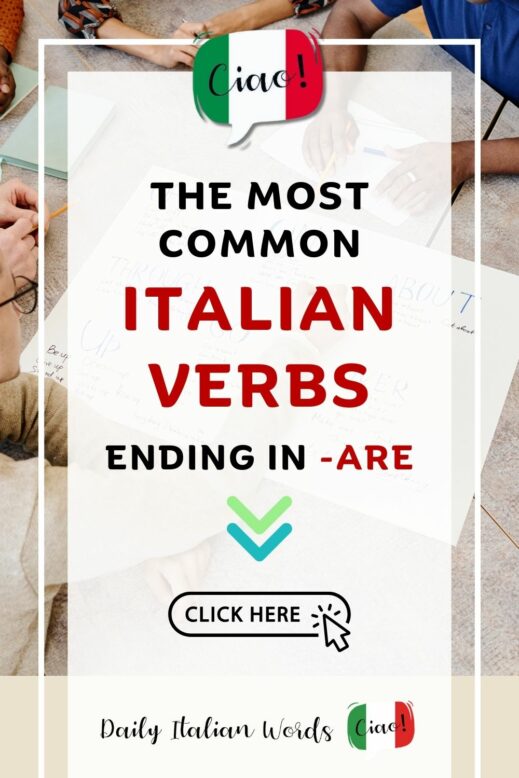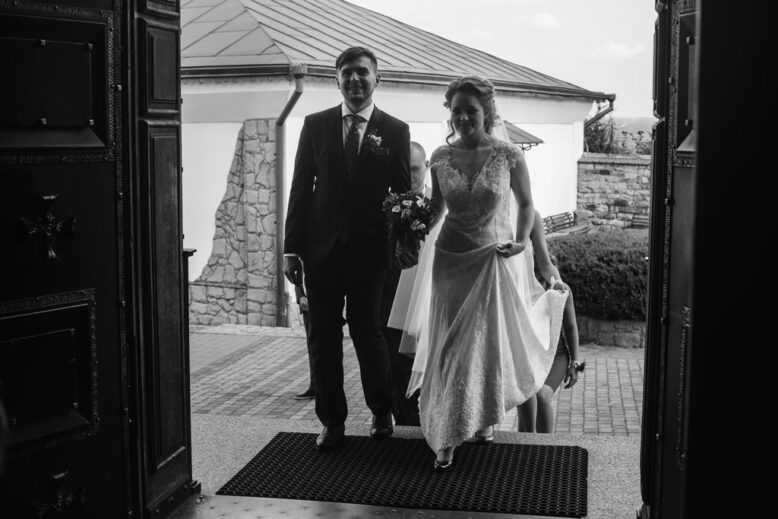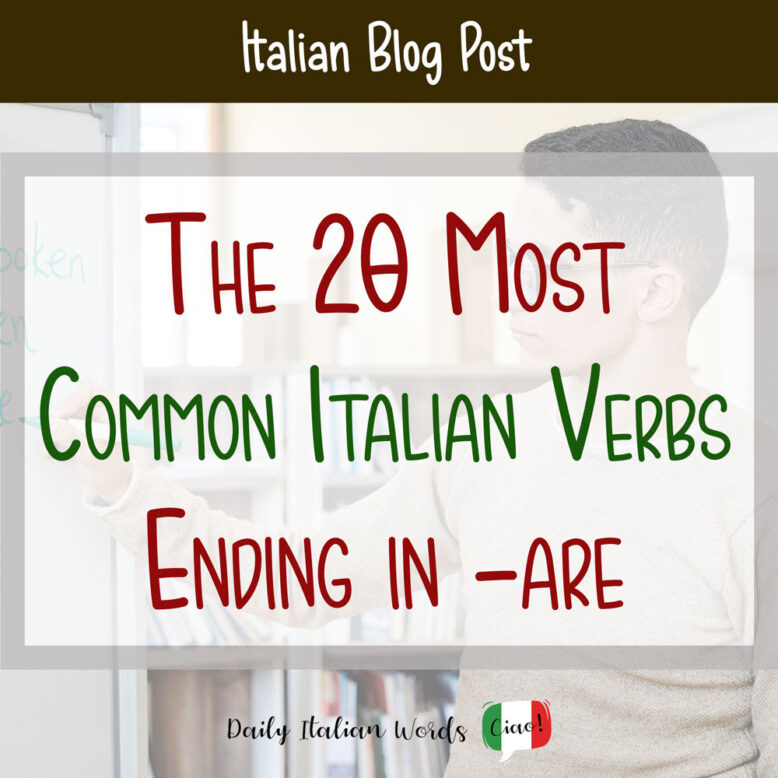Italian verbs can be divided into three groups, classified according to the ending of their infinitive forms: -are, -ere and -ire. Today we’re going to take a closer look at the -are group, otherwise known as the “first conjugation”.
How to conjugate -ARE verbs in Italian
In order to conjugate verbs in the -are group, all you have to do is remove the -are ending and replace it with the following suffixes:
-o
first-person singular (I)
-i
second-person singular informal (you)
–a
third-person singular (he/she/it)
second-person formal (you)
-iamo
first-person plural (we)
-ate
second-person plural (you all)
-ano
third-person plural (they)
This means that, for example, the verb camminare (to walk) conjugates in the following way:
- io cammino = I walk
- tu cammini = you walk (informal)
- Lui/lei cammina = he / she walks
- Lei cammina = you walk (formal)
- Noi camminiamo = we walk
- Voi camminate = you walk (plural)
- Loro camminano = they walk
The vast majority of -are verbs are regular, which means that they always follow this pattern to the letter or exhibit a very slight deviation (see examples with the verbs giocare and mangiare further down).
There are however three* irregular -are verbs whose conjugation is at variance with this pattern: andare (to go), dare (to give) and stare (to be/live/stay). Because these irregular verbs are among the most frequently used in Italian, it is crucial to become familiar with their conjugation as quickly as possible. (Don’t worry, we’ve included them on the list!)
Note: the verb fare (to do/make) may look like an -are verb on the surface, but because it comes from the Latin second conjugation verb facere, it is actually considered an irregular second conjugation verb.
Now that we know what constitutes an -are verb, let’s take a look at twenty of the most common Italian verbs with this ending. If you happen to come across a verb that isn’t on this list, just remember that the same conjugation rules apply.

1. Amare
English meaning: to love
(io) amo = I love
(tu) ami = you love (informal)
(lui) ama = he loves
(lei) ama = she loves
(Lei) ama = you love (formal)
(noi) amiamo = we love
(voi) amate = you love (plural)
(loro) amano = they love
Amo il mio cane più di ogni altra cosa.
I love my dog more than anything else.
2. Andare (irregular)
English meaning: to go
(io) vado = I go
(tu) vai = you go (informal)
(lui) va = he goes
(lei) va = she goes
(Lei) va = you go (formal)
(noi) andiamo = we go
(voi) andate = you go (plural)
(loro) vanno = they go
Oggi vado in banca per richiedere un prestito.
Today I’m going to the bank to ask for a loan.

3. Arrivare
English meaning: to arrive / to reach
(io) arrivo = I arrive
(tu) arrivi = you arrive (informal)
(lui) arriva = he arrives
(lei) arriva = she arrives
(Lei) arriva = you arrive (formal)
(noi) arriviamo = we arrive
(voi) arrivate = you arrive (plural)
(loro) arrivano = they arrive
Oggi arriva il mio nuovo computer, quello che ho ordinato un mese fa!
Today my new computer is arriving, the one I ordered a month ago!
4. Ascoltare
English meaning: to listen
(io) ascolto = I listen
(tu) ascolti = you listen (informal)
(lui) ascolta = he listens
(lei) ascolta = she listens
(Lei) ascolta = you listen (formal)
(noi) ascoltiamo = we listen
(voi) ascoltate = you listen (plural)
(loro) ascoltano = they listen
Ascolto sempre la musica quando vado a correre.
I always listen to music when I go for a run.

5. Cominciare
English meaning: to start / to begin
(io) comincio = I begin
(tu) cominci = you begin (informal)
(lui) comincia = he begins
(lei) comincia = she begins
(Lei) comincia = you begin (formal)
(noi) cominciamo = we begin
(voi) cominciate = you begin (plural)
(loro) cominciano = they begin
Forza ragazzi, cominciamo a lavorare!
Come on guys, let’s start working!
6. Comprare
English meaning: to buy
(io) compro = I buy
(tu) compri = you buy (informal)
(lui) compra = he buys
(lei) compra = she buys
(Lei) compra = you buy (formal)
(noi) compriamo = we buy
(voi) comprate = you buy (plural)
(loro) comprano = they buy
Compra il latte quando torni per favore. Non ce n’è più.
Please buy some milk when you come back. It’s all gone.

7. Dare (irregular)
English meaning: to give
(io) do = I give
(tu) dai = you give (informal)
(lui) dà = he gives
(lei) dà = she gives
(Lei) dà = you give (formal)
(noi) diamo = we give
(voi) date = you give (plural)
(loro) danno = they give
Mi dai un passaggio fino a casa?
Will you give me a ride home?
8. Entrare
English meaning: to enter / to go inside
(io) entro = I enter
(tu) entri = you enter (informal)
(lui) entra = he enters
(lei) entra = she enters
(Lei) entra = you enter (formal)
(noi) entriamo = we enter
(voi) entrate = you enter (plural)
(loro) entrano = they enter
Prego, entrate pure. Vi preparo un buon tè caldo.
Please, come in. I’ll make you a nice warm tea.

9. Giocare
English meaning: to play (a game or sport)
(io) gioco = I play
(tu) giochi* = you play (informal)
(lui) gioca = he plays
(lei) gioca = she plays
(Lei) gioca = you play (formal)
(noi) giochiamo* = we play
(voi) giocate = you play (plural)
(loro) giocano = they play
* As we mentioned in the introduction, certain regular -are verbs deviate slightly from the pattern. In this case of giocare, an ‘h‘ has been inserted into giochi and giochiamo to preserve the hard ‘c‘ in front of i.
I bambini giocano sempre insieme.
The children always play together.
10. Guardare
English meaning: to watch
(io) guardo = I watch
(tu) guardi = you watch (informal)
(lui) guarda = he watches
(lei) guarda = she watches
(Lei) guarda = you watch (formal)
(noi) guardiamo = we watch
(voi) guardate = you watch (plural)
(loro) guardano = they watch
Stasera guardo un po’ di tivù. Non ho voglia di uscire.
Tonight I’ll watch a bit of TV. I don’t feel like going out.

11. Imparare
English meaning: to learn
(io) imparo = I learn
(tu) impari = you learn (informal)
(lui) impara = he learns
(lei) impara = she learns
(Lei) impara = you learn (formal)
(noi) impariamo = we learn
(voi) imparate = you learn (plural)
(loro) imparano = they learn
Sto imparando a suonare il violino. Non è mica facile, sai?
I’m learning to play the violin. It’s not easy, you know?
12. Lavorare
English meaning: to work
(io) lavoro = I work
(tu) lavori = you work (informal)
(lui) lavora = he works
(lei) lavora = she works
(Lei) lavora = you work (formal)
(noi) lavoriamo = we work
(voi) lavorate = you work (plural)
(loro) lavorano = they work
Questi ragazzi lavorano con tanto impegno.
These guys work with a lot of dedication.

13. Mangiare
English meaning: to eat
(io) mangio = I eat
(tu) mangi* = you eat (informal)
(lui) mangia = he eats
(lei) mangia = she eats
(Lei) mangia = you eat (formal)
(noi) mangiamo* = we eat
(voi) mangiate = you eat (plural)
(loro) mangiano = they eat
* As we mentioned in the introduction, certain regular -are verbs deviate slightly from the pattern. In the case of mangiare and all verbs ending in -giare, -ciare and -sciare, the diacritic i disappears from the stem if the ending starts with an i or e (e.g. mangi NOT mangii / mangiamo NOT mangiiamo).
Che cosa mangiamo per cena stasera?
What are we going to eat for supper tonight?
14. Pagare
English meaning: to pay
(io) pago = I pay
(tu) paghi* = you pay (informal)
(lui) paga = he pays
(lei) paga = she pays
(Lei) paga = you pay (formal)
(noi) paghiamo* = we pay
(voi) pagate = you pay (plural)
(loro) pagano = they pay
* As we mentioned in the introduction, certain regular -are verbs deviate slightly from the pattern. In this case of pagare, an ‘h‘ has been inserted into paghi and paghiamo to preserve the hard ‘G‘ sound in front of i.
Oggi vado alla posta a pagare le bollette.
Today I’ll go to the post office to pay the bills.

15. Parlare
English meaning: to speak / to talk
(io) parlo = I speak
(tu) parli = you speak (informal)
(lui) parla = he speaks
(lei) parla = she speaks
(Lei) parla = you speak (formal)
(noi) parliamo = we speak
(voi) parlate = you speak (plural)
(loro) parlano = they speak
Non si parlano più da mesi oramai.
They haven’t talked to each other for months now.
16. Pensare
English meaning: to think
(io) penso = I think
(tu) pensi = you think (informal)
(lui) pensa = he thinks
(lei) pensa = she thinks
(Lei) pensa = you think (formal)
(noi) pensiamo = we think
(voi) pensate = you think (plural)
(loro) pensano = they think
Penso a te giorno e notte!
I think about you day and night!

17. Stare (irregular)
English meaning: to stay / to be / to live
(io) sto = I stay
(tu) stai = you stay (informal)
(lui) sta = he stays
(lei) sta = she stays
(Lei) sta = you stay (formal)
(noi) stiamo = we stay
(voi) state = you stay (plural)
(loro) stanno = they stay
Oggi sto a casa. Ho un sacco di compiti da fare.
Today I’m staying at home. I have a lot of homework to do.
18. Tornare
English meaning: to return / to go back
(io) torno = I return
(tu) torni = you return (informal)
(lui) torna = he returns
(lei) torna = she returns
(Lei) torna = you return (formal)
(noi) torniamo = we return
(voi) tornate = you return (plural)
(loro) tornano = they return
Tornate a casa! Il tempo sta peggiorando.
Go back home! The weather is getting worse.

19. Trovare
English meaning: to find
(io) trovo = I find
(tu) trovi = you find (informal)
(lui) trova = he finds
(lei) trova = she finds
(Lei) trova = you find (formal)
(noi) troviamo = we find
(voi) trovate = you find (plural)
(loro) trovano = they find
Lo trovo strano che non ti abbia ancora richiamato.
I find it strange that he hasn’t called you back yet.
20. Visitare
English meaning: to visit
(io) visito = I visit
(tu) visiti = you visit (informal)
(lui) visita = he visits
(lei) visita = she visits
(Lei) visita = you visit (formal)
(noi) visitiamo = we visit
(voi) visitate = you visit (plural)
(loro) visitano = they visit
Oggi, i ragazzi visitano la città e si fermano a mangiare in centro.
Today, the kids are going to visit the town and stop to eat downtown.


Heather Broster is a graduate with honours in linguistics from the University of Western Ontario. She is an aspiring polyglot, proficient in English and Italian, as well as Japanese, Welsh, and French to varying degrees of fluency. Originally from Toronto, Heather has resided in various countries, notably Italy for a period of six years. Her primary focus lies in the fields of language acquisition, education, and bilingual instruction.


